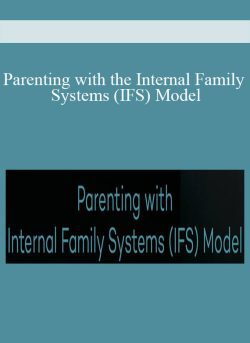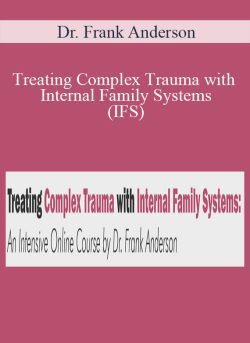Dr. Frank Anderson – Treating Complex Trauma with Internal Family Systems (IFS): An Intensive Online CourseAfter decades of clinical breakthroughs and scientific research, the Internal Family Systems model has been shown to be effective for healing even the most complex trauma.Add additional power to your current clinical approach and make trauma treatment more effective in a short period of time when you incorporate Internal Family Systems (IFS) in your practice.Join Dr. Frank Anderson, psychiatrist, author, and vice chair of the Foundation for Self Leadership — the leading organization dedicated to advancing the IFS model through research and training — in this comprehensive online course where he will give you a step–by–step guide for applying IFS into your clinical practice.Throughout the online course, special emphasis will be given to understanding how trauma affects the brain and how you can use IFS to heal complex trauma and its common co-morbidities, including anxiety, depression, panic, insomnia, obsessive-compulsive behavior, and more.You’ll also get exclusive insight on how neuroscience can inform why, how and what IFS techniques you should use to maximize your clinical outcomes — so you’ll know exactly how to empower your clients to overcome even the most complex traumas.Learning IFS has never been easier — revolutionize your clinical approach and help your clients heal!You’ve likely heard your clients explain their feelings of conflicting emotions, “a part of me wants to…and then there’s a part of me that doesn’t…” as they grapple with their internal “Self,” desires, and behaviors.With the transformative IFS approach, the idea of multiplicity of the mind is normal. Every part has a good intention, and every part has value. Even for trauma survivors.Through engaging case studies, in-session demonstrations, and masterfully presented lectures, Dr. Frank Anderson will show you step-by-step how to apply the most effective, empirically-validated IFS interventions to help your clients listen to and understand their conflicting parts to master their emotions — so they can discover deep, lasting healing.Here’s what you’ll learn in this online course…Accelerate the healing from complex trauma by integrating the IFS model into your current clinical practiceImprove assessment and treatment planning with tools to help identify, specify, and clarify the protective parts of clients with trauma historiesProtect clients from emotional and psychological pain by offering an alternate view of symptoms and psychopathology that shows clients how parts are trying to protect themShowcase a non-pathological perspective of mental health disorders by demonstrating how IFS translates common comorbidities into parts languageIncrease your curious and compassionate self when using IFS to work with clients who have trauma histories.Improve clinical outcomes by learning how to differentiate between therapeutic and biological conditions.Heal clients’ traumatic wounds through the unique IFS internal attachment model.Handle extreme symptoms of trauma by determining if they are rooted in sympathetic activation or parasympathetic withdrawal.Gain quicker access to your client’s traumatic vulnerabilities through IFS specific therapeutic techniques that shift arousal and withdrawal.Use neuroscience to inform your therapeutic decision–making so you’ll know exactly what tool or strategy to use to help your clients heal.Integrate IFS with your current treatment approaches including EMDR, DBT, and Sensorimotor Psychotherapy.Through nine comprehensive video modules you’ll learn…How to Treat the Various Types of TraumaAcute traumaPTSDComplex or relational traumaDevelopmental and attachment traumasExtreme or dissociative traumaInternal Family Systems (IFS) ModelThe origins, goals & assumptionsA non-pathologizing, accelerated approach, rooted in neuroscienceHow IFS differs from phase-oriented treatmentThe importance of our protective responsesDealing with emotional overwhelm head-onMultiplicity of the mind — we all have partsClinical considerations for clients experiencing abuseThe IFS TechniqueStep 1: Identify the Target SymptomApplying meditation practicesSeparating the person (self) from the symptomLearning about its intentionStep 2: Gain Access to Internal Strengths & Resources for HealingMoving from defensiveness to curiosityThe “Self” of the therapist-countertransference redefinedAccessing compassion to open the pathways toward healingRole of empathy in healing — the benefits and the downsidesStep 3: Find the Fear and Function of the SymptomFocusing on its fearThe real story behind the symptomFostering the internal relationshipStep 4: Healing of Traumatic WoundsThree phases to healing: Witness the pain, remove the wounded part out of the past, and let go of the feelings, thoughts and beliefsScience behind the healing — memory reconsolidationAttachment Disorders and Relational TraumaIFS as internal attachment workAttachment styles as parts of selfAttachment trauma — the role of the therapistHeal relational wounds of childhoodClient’s “Self” as the corrective objectWork with preverbal traumaManage Common Co-MorbiditiesDepression, panic attacks, substance abuse, eating disorders, ADD and OCDA non-pathological approachComorbidities as protective responses to traumaSymptoms as “parts of the self”Differentiate Therapeutic Issues from Biological ConditionsIntersection of biology and situation (“Real Mind-Body Medicine”)Therapist’s role in biology — When to refer and when to work it throughPsychotherapy of psychopharmacologyThe Neurobiology of TraumaNeuroscience for therapists — what you need to knowFear circuitry and the development of PTSDExtreme reactions and Autonomic Nervous SystemRage to suicide and dissociation to shameDealing with the Extreme Reactions of TraumaTalking directly to the symptomIntroducing the part to the “Self”Dealing with the overwhelm — no need for building resourcesHow to stay clear and calm while working with clients in extreme statesHow Neuroscience Informs Therapeutic DecisionsTop-down and bottom-up strategies rooted in neuroscienceWhen it’s necessary to take over and “be the auxiliary brain” for your clientWhen it’s best to slow things down, hand over control and work with the bodySensing vs. making sense of thingsAt home strategiesIntegrate IFS into Your Treatment ApproachEMDR, DBT, Sensorimotor/SE and other methodsTransformation vs adaptation or rehabilitationGoing beyond the cognitive (experiential therapies)Integrating IFS with your current clinical approachThis intensive online course also includes:Live demonstrationsMeditationsPractice sessionsMeet Your Course Expert:Frank Guastella Anderson, MD, completed his residency and was a clinical instructor in psychiatry at Harvard Medical School. He is both a psychiatrist and psychotherapist. He specializes in the treatment of trauma and dissociation and is passionate about teaching brain-based psychotherapy and integrating current neuroscience knowledge with the IFS model of therapy.Dr. Anderson is the vice chair of the Foundation for Self Leadership. He is a trainer at the Center for Self Leadership with Richard Schwartz, Ph.D., and maintains a long affiliation with, and trains for, Bessel van der Kolk’s Trauma Center at Justice Resource Center in Boston, MA.Dr. Anderson has lectured extensively on the Neurobiology of PTSD and Dissociation and wrote the chapter “Who’s Taking What” Connecting Neuroscience, Psychopharmacology and Internal Family Systems for Trauma in Internal Family Systems Therapy-New Dimensions. He co-authored a chapter on “What IFS Brings to Trauma Treatment in Innovations and Elaborations in Internal Family Systems Therapy” and recently co-authored “Internal Family Systems Skills Training Manual.”Dr. Anderson maintains a private practice in Concord, MA, and serves as an Advisor to the International Association of Trauma Professionals (IATP).Speaker Disclosures: Financial: Frank Anderson maintains a private practice. He receives a consulting fee from the Center for Self Leadership. Dr. Anderson receives a speaking honorarium from PESI, Inc. Non-financial: Frank Anderson is the President of the Foundation for Self Leadership.Salepage: https://catalog.pesi.com/sales/bh_001272_ifscomplextrauma_090418_organic-85923 Archive: https://archive.fo/YrKoiDelivery Method– After your purchase, you’ll see a View your orders link which goes to the Downloads page. Here, you can download all the files associated with your order.– Downloads are available once your payment is confirmed, we’ll also send you a download notification email separate from any transaction notification emails you receive from Forimc.me.– Since it is a digital copy, our suggestion is to download and save it to your hard drive. In case the link is broken for any reason, please contact us and we will resend the new download link.– If you cannot find the download link, please don’t worry about that. We will update and notify you as soon as possible at 8:00 AM – 8:00 PM (UTC+8).Thank You For Shopping With Us! Reviews There are no reviews yet.Be the first to review “Dr. Frank Anderson – Treating Complex Trauma with Internal Family Systems (IFS): An Intensive Online Course” Cancel replyYour rating *Rate…PerfectGoodAverageNot that badVery poorYour review *Name *Email *Δ
 Parenting with the Internal Family Systems (IFS) Model
₹4,814.00
Parenting with the Internal Family Systems (IFS) Model
₹4,814.00
 Carla Moschella – Acute and Chronic Kidney Disease: Assessment, Management & Treatment Strategies
₹4,814.00
Carla Moschella – Acute and Chronic Kidney Disease: Assessment, Management & Treatment Strategies
₹4,814.00
Dr. Frank Anderson – Treating Complex Trauma with Internal Family Systems (IFS): An Intensive Online Course
₹9,794.00






